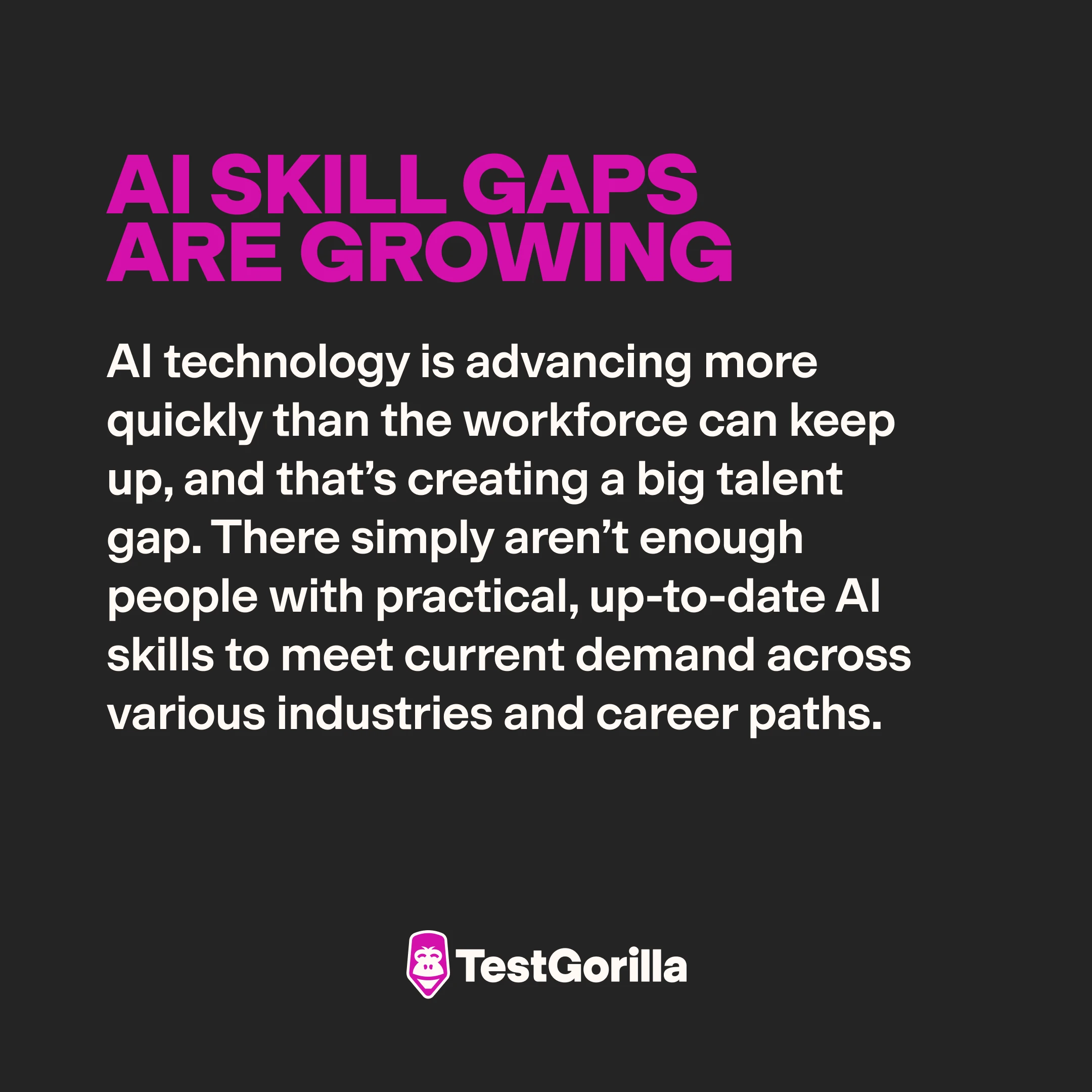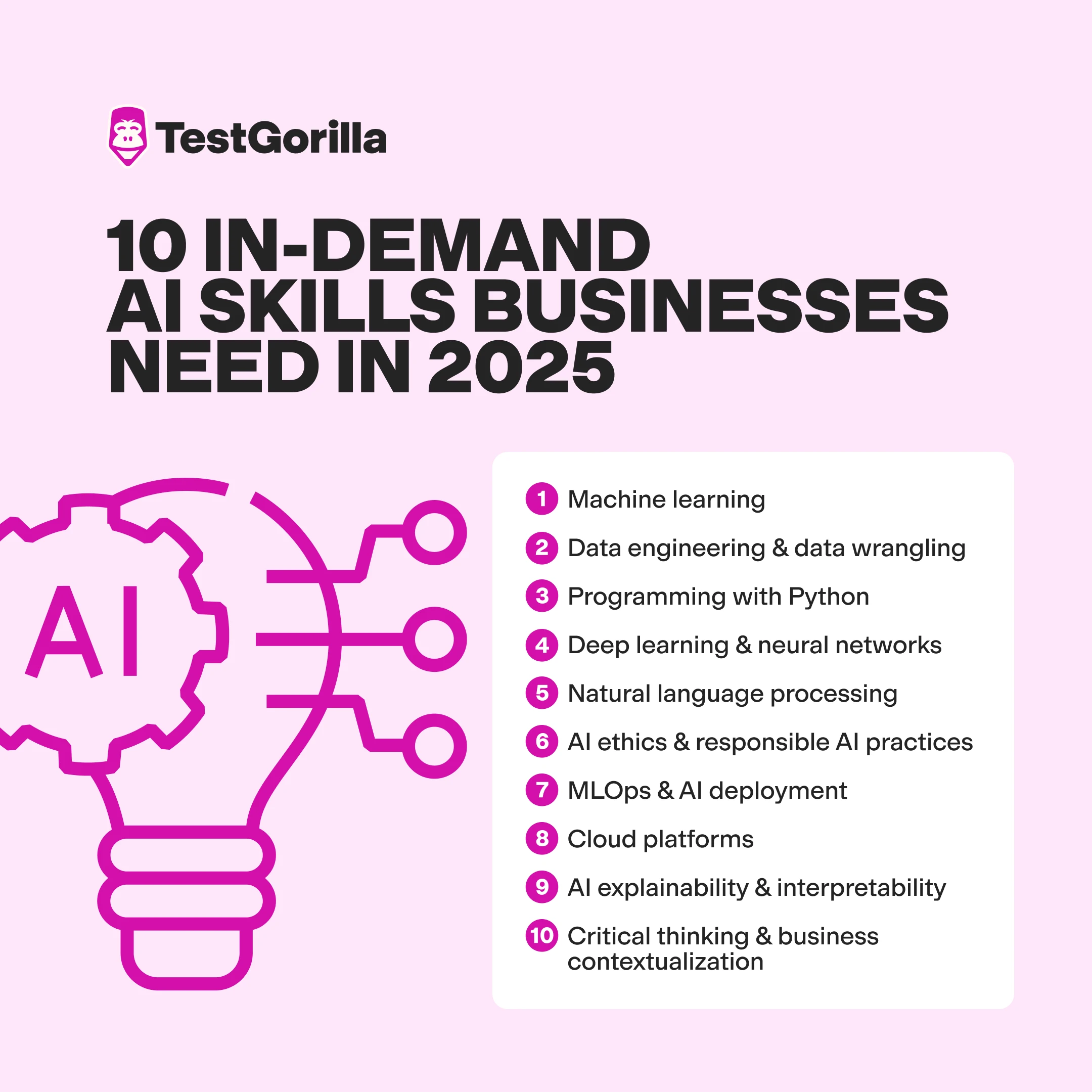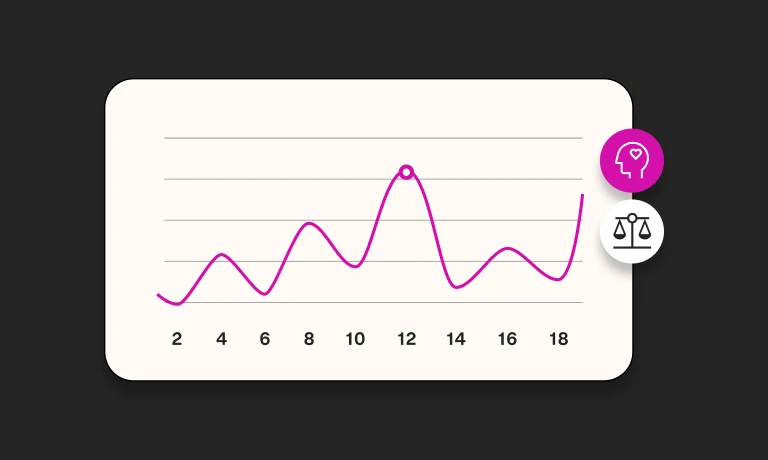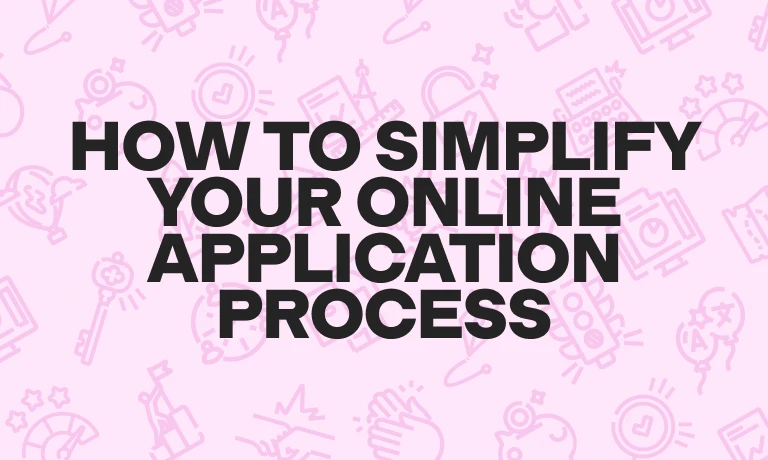Over the last few years, artificial intelligence (AI) has gone from a buzzword to a driving force behind change and transformation across every aspect of business. And for hiring managers like you, AI isn’t just changing the way your company works – it’s also changing your hiring approaches. You need employees with a deep understanding of AI tech and the skills necessary for innovation.
But what do artificial intelligence skills actually look like? How can you know which candidates are truly AI-savvy and which are behind the curve?
The first piece of the puzzle is knowing which skills to look for. The other is using structured assessments, such as our AI skills test, to measure them.
In this guide, we highlight 10 in-demand AI skills your business needs and show you how to identify them.
Why AI skill gaps are growing
Simply put, AI technology is advancing more quickly than the workforce can keep up, and that’s creating a big talent gap. There simply aren’t enough people with practical, up-to-date AI skills to meet current demand across various industries and career paths.
This mismatch is already showing up in the market. A recent report found that AI skills can boost salaries by up to 47%, reflecting just how valuable – and hard to find – these capabilities are.
Importantly, high demand doesn’t mean every applicant with “AI” on their resume has what it takes to thrive. Many candidates struggle with:
Having theoretical knowledge of AI tools, but little to no real-world application
Gaps in interdisciplinary knowledge, including AI ethics or domain-specific experience
Overstated skills that don’t hold up to evaluation
10 in-demand AI skills businesses need in 2025
Here are 10 of the most important AI skills to look for in candidates this year:
1. Machine learning
Machine learning (ML) is the engine behind most AI systems. It enables computers to learn from data and make predictions without being explicitly programmed. ML can power everything from predictive analytics to fraud detection to data mining and more. It can also be used to build tools that automate decisions, identify patterns in large datasets, and adapt to new inputs in real time.
Top talent needs a strong understanding of and hands-on experience with core ML approaches: supervised learning, unsupervised learning, and reinforcement learning. They should also have experience training large language models (LLMs), which rely on these techniques.
2. Data engineering & data wrangling
AI-enabled systems are only as good as the data that feeds them. Before the systems can run, data must be collected, cleaned, structured, and validated – typically across vast, disorganized datasets. That makes data engineering and data wrangling two top-demand skills.
Candidates should be comfortable creating data pipelines, managing SQL and NoSQL databases (popular types of databases that house data used to train AI models), and performing statistical analysis to guarantee high-quality, relevant data.
These responsibilities require proficiency in programming languages and frameworks for processing big data, such as Python, R, Hadoop, and Apache Spark.
3. Programming with Python
While experience with other languages is a bonus, Python fluency is non-negotiable for most AI roles. This is because most major AI libraries – including TensorFlow, PyTorch, and Scikit-learn – are written in Python.
4. Deep learning & neural networks
A subset of machine learning, deep learning uses artificial neural networks to analyze data and make predictions. It powers technologies like facial recognition, autonomous vehicles, and generative AI.
Candidates should have a strong understanding of neural network architectures and experience using deep learning frameworks, such as TensorFlow and PyTorch. They should also know how to fine-tune pre-trained neural networks and optimize their performance across modalities.
Since deep learning is complex, candidates should also possess strong critical thinking and problem-solving skills.
5. Natural language processing
Natural language processing (NLP) enables machines to interpret and generate human-sounding language. It’s used to build customer service chatbots, analyze customer sentiment in communications, summarize documents and meetings, and improve database searches.
NLP work requires proficiency in Python, experience with machine learning, and skills in data handling. It also requires an understanding of how to tokenize data and proficiency in using NLP-focused programming libraries, such as NLTK, Gensim, and spaCy.
6. AI ethics & responsible AI practices
Increasing regulations and reputational scrutiny around AI mean that designing responsible AI systems is no longer optional. Companies that lack a strong ethical foundation for their AI tools risk financial penalties and reputational harm.
Candidates should possess an understanding of responsible AI practices, as well as strong communication and collaboration skills. They also need to be empathetic and adaptable in response to changing ethical AI requirements.
7. MLOps & AI deployment
After AI engineers build models, they need to deploy, monitor, and scale them. This is known as machine learning operations (MLOps), and it combines aspects of AI engineering and operations management. MLOps is critical to ensure that AI-enabled tools grow with your business and incorporate the latest technological improvements.
MLOps applicants must be highly proficient in version control and continuous integration/continuous development (CI/CD) practices. They also need to be skilled at resource allocation and comfortable using pipeline orchestration tools, such as Kubernetes and Apache Airflow.
8. Cloud platforms
AI applications lean heavily on cloud platforms for scalable processing power and data storage. In fact, unless your business has its own data center, your AI models will likely be trained and run in the cloud using data stored in the cloud.
This means candidates must have experience using major cloud computing platforms, such as Amazon Web Services, Microsoft Azure, and Google Cloud Platform. They should know how to manage cloud service costs and be familiar with the built-in tools these platforms offer for AI, such as pre-trained models.
9. AI explainability & interpretability
AI explainability is crucial to ensure stakeholders understand why an AI model is making certain predictions or decisions. It’s key for regulatory compliance, error prevention, and building trust with employees and customers.
Candidates need to be skilled at incorporating explainability into their model designs. They should have experience using techniques such as Local Interpretable Model-Agnostic Explanations (LIME) and Shapley Additive Explanations (SHAP), which aim to explain model decisions post-training.
Applicants also need strong communication skills to help stakeholders better understand the AI tools they’re using.
10. Critical thinking & business contextualization
AI tools are only effective if they’re 1) matched with your business’s goals and 2) solve real problems for your employees and customers. That’s why critical thinking and contextual awareness are key.
As Taimur Ijlal – a senior security consultant at Amazon Web Services and author of the book AI Governance and Cybersecurity – puts it, “businesses need professionals who can manage technical capabilities while aligning them with real-world business goals. It’s not enough to just build something with AI – it has to solve the right problem.”
Top candidates should be able to evaluate trade-offs, connect technical work to strategic objectives, ask the right questions, and communicate clearly with project managers.
The best insights on HR and recruitment, delivered to your inbox.
Biweekly updates. No spam. Unsubscribe any time.
How to find candidates with in-demand AI skills
Hiring for AI proficiency can be challenging because traditional hiring practices make it nearly impossible to determine who actually has the necessary interpersonal and technical skills. That’s why skills-based hiring is essential.
Here’s how to take a skills-first approach to find candidates with AI capabilities:
Start with specific, role-aligned skill definitions
The first step is to know exactly what you’re hiring for. Skip vague job titles (like “AI Engineer” or “Data Scientist”) and requirements (like “AI-proficient”), and clearly define the role and its required AI skills.
Ask yourself:
What problems will this person solve?
Which AI tools or technologies will they use?
What are you hiring them to do? Will they:
Build and train machine learning models?
Design data pipelines and infrastructure?
Deploy and monitor AI tools in production?
Lead AI strategy and cross-functional adoption?
Do they need domain knowledge (e.g., finance, healthcare, retail)?
Use your answers to craft specific job titles and requirements. For instance, instead of “AI Developer,” the job title could be “Machine Learning Engineer – Predictive Modeling” and require experience with supervised learning, data wrangling with Python and Pandas, and deployment with Amazon Web Services’s SageMaker.
You’ll then use this information to create a job description that will give curious applicants a clear picture of whether they’re truly a match.
Use talent assessments to identify top candidates early
You can’t rely solely on resumes to measure a candidate’s abilities. Instead, use objective assessments that evaluate the skills you actually need. We highly recommend conducting talent assessments early in the hiring funnel, before interviews, so you can save time and resources for the candidates who are most aligned with the role’s requirements.
With a talent assessment platform like TestGorilla, this part of the process is quick and straightforward. We have a library of hundreds of tests, including:
Our AI-specific programming skills tests (such as the Python coding tests, Neural Network test, and Machine Learning in Amazon Web Services test)
Our soft skills tests, including ones that measure capabilities crucial for AI-driven roles, like critical thinking, problem-solving, and communication
Our various personality tests, which enable you to learn more about how applicants approach work
You can combine up to five tests to create an assessment perfectly tailored to your role’s requirements. Most tests take around 10 minutes to complete, meaning a full custom assessment can be completed in under an hour!
TestGorilla will automatically rank candidates based on their scores, so you can assemble a shortlist of top talent in no time.
Dig deeper with portfolio reviews (if applicable)
Once you’ve shortlisted candidates based on skills, review candidates’ portfolios to see how they’ve used AI in the real world. This step applies only to roles involving hands-on development, experimentation, or model deployment.
If that sounds like the position you’re hiring for, explore candidates’ GitHub repositories and Colab notebooks, contributions to Kaggle or AI blogs, and their involvement in open-source projects. Look for evidence of end-to-end project work, thoughtful documentation, and real-world impact.
Ask the right questions in interviews
Asking interview questions that evaluate AI proficiency can help you further explore candidates’ strengths and weaknesses.
Start with questions about challenges they encountered on past AI projects and how they solved them. This gives insights into candidates’ problem-solving, critical thinking, and team collaboration abilities.
Then, ask what aspects of AI they’re most excited about. This shows that candidates are passionate about their work, are following new developments in the AI field, and are enthusiastic about continuous learning.
Hire talented AI candidates today with TestGorilla
Talented AI job candidates may be in short supply, but there is a way you can attract and hire them: by knowing what skills you need for your role and assessing them the right way.
Some of the most important AI skills include machine learning, data engineering, Python programming, software deployment, and critical thinking. Highlight these skills in your job description and drill down into them during hiring through talent assessments and targeted interview questions.
With TestGorilla, assessing what matters is a breeze. If you’re ready to find your next AI hire, book a demo with TestGorilla today!
Related posts
You've scrolled this far
Why not try TestGorilla for free, and see what happens when you put skills first.




















